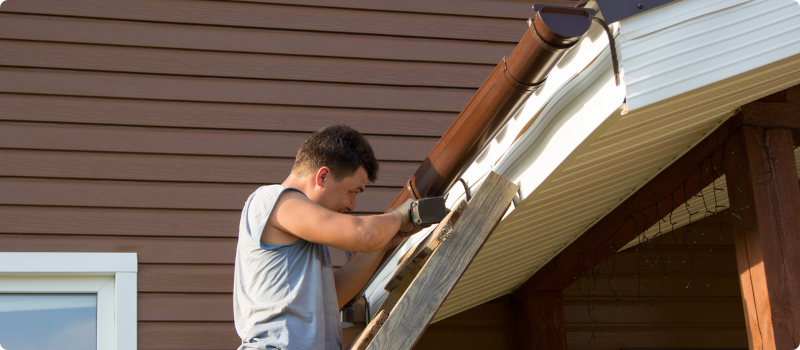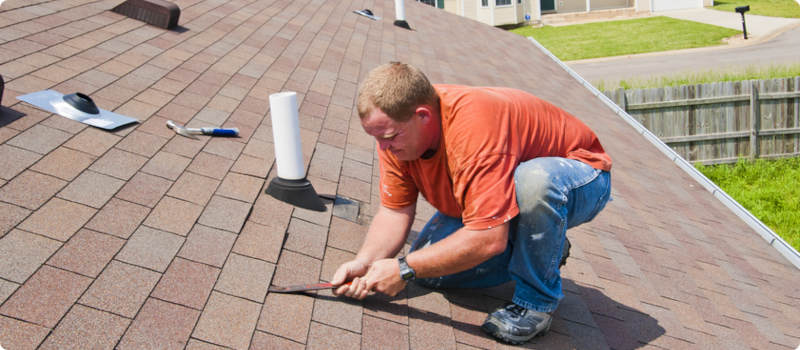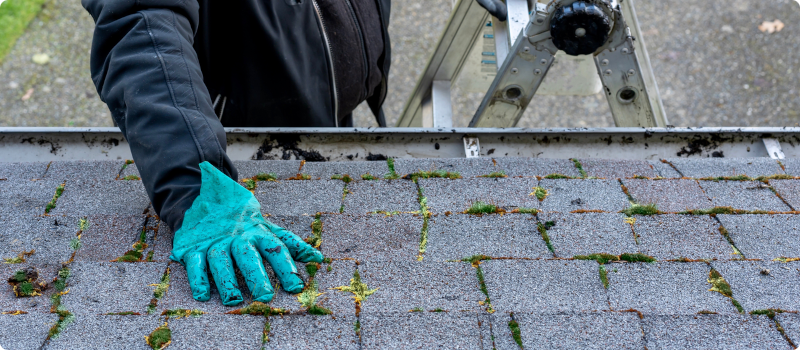Why is my roof leaking?
Updated May 12, 2022 . AmFam Team
You’re admiring the rain from the comfort of your home when you notice a sound — the unmistakable drip of water dropping onto your floor. The first and hardest step is figuring out why your roof is leaking. And with these tips, you’ll find the culprit in no time!
Here’s why your roof is leaking
The list of reasons why your roof is leaking may seem long, but don’t worry — when it comes to finding the leak and fixing it, the finding is the hardest part. And the good thing about these problems? They can all be fixed. Check out the list and see what’s troubling your roof:
Your roof is old
Roofs don’t last forever. Protecting your home and everything inside it from the elements comes with a cost. And with all that rain, snow, ice, wind and even sunlight wearing down your roof, it becomes more susceptible to leaks. Every roof will eventually need to be replaced, so learn more about how long your roof should last based on what it’s made of.
There’s debris on your roof
When things like sticks, leaves and other material collect on your roof, they can scrape against it and cause damage. And if they’re holding in moisture, they can gather mold and wreak even more havoc. Always check your roof after significant weather events, including strong winds, to make sure it’s clear of foreign material and if any shingles have been lifted or are missing.

Your gutters and downspouts aren’t working correctly
When that debris makes its way into your gutters, it can clog them up and make their jobs harder. And when they can’t carry water from the roof down to the ground, water can pool up in the gutters near the edge of your roof and cause some of the same moisture problems. In the fall and winter, it can create ice dams once it freezes, which can be even more dangerous to your roof and home.
There are holes in your shingles and roof
Whether from severe weather, animals or accessories you’ve had attached to your roof, a hole in a shingle, or lifted and missing shingles, can lead to a roof leak. That damage will likely cause your roof to hang on to a small amount of water which can weaken its structure.

Your roof vents are loose
Roof vents allow air in and out of your attic and other parts of your home. When they become loose or slightly detached from the roof, moisture can make its way under the vent’s edges and into your home.
Your roof flashing has come unattached
Roof flashing is metal that covers the joints between your roof and things like skylights, chimneys and vent pipes. Like your roof vents, the flashing connecting these things to your roof can loosen and let water in.

The roof’s valley(s) are wearing down
A roof valley is where the slopes of your roof meet — and since your roof isn’t all one piece, wind, snow and ice accumulation can damage the valleys and their flashings on your roof. Look for missing or worn shingles near a valley, as they can be great indicators of how much weathering it’s taken.
Your attic is too humid
While not technically a roof leak, condensation in your attic can lead to leaks in your ceiling and give the appearance that there is something wrong with your roof. And even though it’s not a roof issue, you should still take time to check it out — too much moisture in your attic can cause mold, deterioration of wood and insulation. Proper ventilation in the attic is critical to prolonging the life of your roof, as well as the health and safety of all those who call your house home.
Whether you were able to figure out why your roof is leaking or not, your next step should be to call a professional. Roof leaks must be fixed at the source — and unless you’re a professional roofer, you should never attempt to get on your roof. Additionally, if you’re trying to investigate your leak further, do not get in your attic. Simply look in with a flashlight and try to spot the source — a professional roofer will handle the rest.
Your American Family Insurance agent can help you prepare for the unexpected. Ask them about roof insurance or other home insurance options and get the peace of mind you deserve.
*Homeowners premiums are based on a variety of factors including roof age, roof material and more, which impacts the rate you are quoted and that you will pay.
This article is for informational purposes only and based on information that is widely available. We do not make any guarantees or promise any results based on this information.

